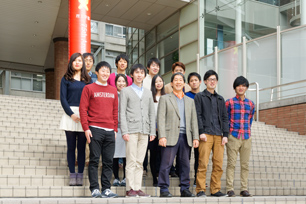Shuhei Inada, Associate Professor, Faculty of Science and Technology, Department of Administration Engineering
Identifying and Solving Problems in Production Areas
“Rigorous but fun”—with this as our motto, my students and I are furthering our research on how we can build production systems that enrich and bring comfort to our lives.

Industrial Engineering (IE) is a theory as well as a technology that looks closely at production systems in which management resources such as people, goods, money, and information are integrated effectively using scientific methods to provide goods and services in a timely manner and at high quality and low price. The Japanese term kaizen (meaning improvement) is now a word borrowed in factories worldwide, and IE provides the theoretical foundation that supports this notion.
In the laboratory we are developing technology and making theoretical inquiries related to the management and improvement, or kaizen, of production systems based on IE. For example, some of the themes we are dealing with include efficient use of workers with all-round skills, optimization of material flow in warehouses, and assessment of work systems based on workers’ attention and point of gaze. In recent years, we are considering the possibility of employing IE for service systems in hospitals, hotels, and so on, and we are also developing various methodologies to improve the work system by robots.
We conduct research in various ways: there are days we visit factories and spend the whole day collecting data; and some days we perform computer simulations or play around with numbers and formulas. However, what is consistent throughout our research activities is that we try to keep an open mind in accepting the reality observed and the data collected on-site, and by thinking about the theoretical implications of these observations, we construct and verify hypotheses. Through persistent investigations on-site or analyzing things from a fresh, new perspective, it is not rare for the world to suddenly open up to the students.
In order to continuously improve (kaizen) and innovate (kaikaku), the logical reasoning at the base of mathematical and scientific thinking is no doubt an extremely powerful and useful tool. On the other hand, kaizen and kaikaku are implemented by people, so understanding and researching from an academic perspective the actual people who are carrying out kaizen and kaikaku is vital in allowing these processes to progress steadily. I would like to continue our research without losing this balance.
Student’s Voices
Masashi Fuchizawa
Second-year master’s student, Graduate School of Science and Technology(at the time of writing)
Looking for “Waste”
In our lab, we are always thinking about how to make things work more efficiently in terms of time, money, fatigue level, and so on. If we find anything wrong, we consider it as “waste,” and we are researching the different types of waste that exist in our daily lives, with a particular focus on sites where goods are manufactured. When you actually visit and analyze what goes on at these sites, you realize there are much more instances of wastes than you imagined. Under Inada-sensei, students are all working together to eliminate waste, solving issues from different angles and through open-minded and creative ideas.
*Position titles, etc., are those at the time of publishing.
